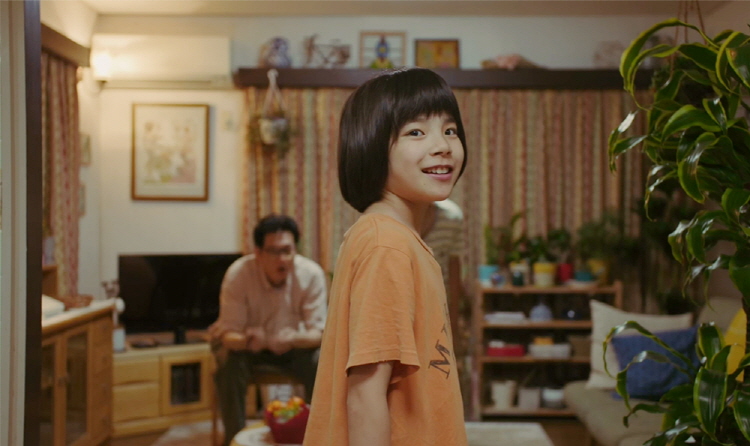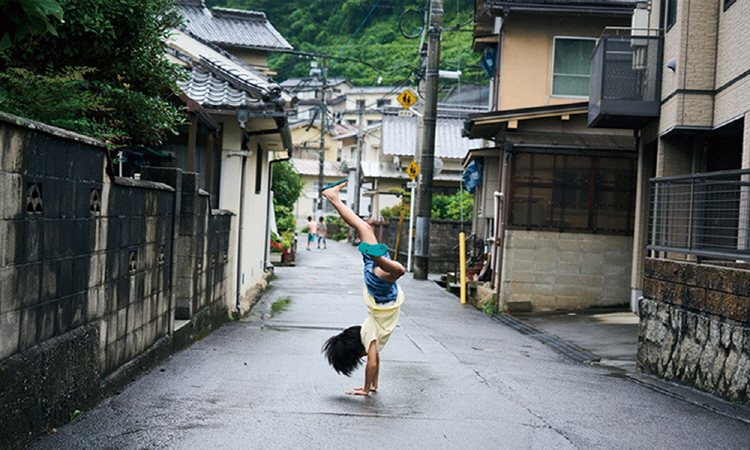Japanese film “Amiko” is a dry but painful coming-of-age tale about one odd and socially awkward young girl who often clashes with the increasingly gloomy reality surrounding her. While it is quite uncomfortable to observe how frequently she struggles to process and understand her situation via her limited viewpoint, the movie calmly sticks to its detached attitude without losing any of its restrained empathy toward her, and we come to understand accept more who she is, instead of simply regarding her as an embarrassing case study.
During the early part of the story, the movie, which is set in a suburb neighborhood outside Hiroshima, slowly establishes its young heroine and several supporting figures surrounding her. We see how Amiko (Kana Ôsawa) does not behave that properly in front of others including her schoolmates and her family, and you may wonder whether her parents have ever sent her to any child psychiatrist. It is fortunate for her that her parents and older brother can tolerate many of her socially inappropriate behaviors, but they do not seem to really understand her despite caring about her enough, and there is always the gap between them and her.
As a guy who was diagnosed to be on the autistic spectrum 12 years ago, I easily recognized certain typical behavioral traits from Amiko, but the movie thoughtfully avoids making her into a stereotypic case of autism or personality disorder. Sure, I constantly felt an urge to call a specialist as she often reminded me of some painful and embarrassing moments in my childhood and adolescent years, but she came to me as a very believable human character nonetheless because director/writer Yusuke Morii, who adapted the novella of the same name by Natsuko Imamura, brings specific details to his little heroine bit by bit along the story. She is indeed often quite annoying and willful to say the least, but there is always irrepressible innocence behind her socially awkward behaviors, and you can sense how her family have tolerated her to some degree for years.
Following the examples from the works of Hirokazu Kore-eda, Morii and his crew members including Hiroshi Iwanaga slowly immerse us into the mundane reality surrounding Amiko via subtle scene composition and color scheme, while often limiting the movie inside Amiko’s narrow viewpoint. For example, it takes some time for us to learn how devastated Amiko’s stepmother becomes after one serious personal incident, and we naturally brace ourselves when Amiko commits something quite unwise thing which inadvertently breaks her stepmother’s heart. Iwanaga’s camera just plainly presents this very painful moment in medium shot as distantly observing all of the figures on the screen from their back, but its melodramatic aspect is conveyed to us so well that we do not need any unnecessary close-up shot at all in this case. As a matter of fact, late film critic David Bordwell, who once pointed out how many of modern movies thoughtlessly indulge in too many close-up shots these days, would appreciate the emotional effectiveness of this seemingly plain but undeniably harrowing scene a lot in my inconsequential opinion.
After her huge mistake, everything becomes much more serious around Amiko. While her father becomes colder and more distant to her than before, her older brother is somehow turned into your average juvenile delinquent, and a local boy who is supposed to be her best friend comes to distance himself away from her due to that big mistake of hers. Things naturally get worse when Amiko begins her first high school year, and the only consolation for her is that she is merely ostracized than bullied due to her older brother’s, uh, notoriety among her schoolmates.
In addition, she gets herself delving into her own world. After frequently hearing weird sounds, Amiko comes to believe that a ghost is hanging around her family house, and her attempts to cope with this strange happening certainly annoys others including her father a lot. As a matter of fact, she even makes a little song for chasing away the ghost, and that leads to an offbeat musical fantasy moment, which is incidentally one of a few heavy-handed touches in the film.
Nevertheless, we still care and fear for Amiko as observing more of her pain and confusion along the story, and young newcomer Kana Ôsawa did a remarkable job here in this movie. Besides deftly handling a number of understandably shrill moments which will definitely make you cringe, she fills her character with enough sense of life and personality, and her engaging performance comes to function as the beating human heart of the film.
Morii also draws good performances from several main cast members around Ôsawa, who tactfully fill their respective spots without overshadowing her commendable efforts at all. Arata Iura and Machiko Ono are solid as the two substantial adult characters who have each own matter of heart to deal with, and the other young performers in the film besides Ôsawa are effective in their natural unadorned acting.
In conclusion, “Amiko” turns out to be a much tougher stuff than I expected, but I admire Morii’s skillful handling of story and characters at least in addition to being quite impressed by Ôsawa’s strong lead performance. Probably because it touched upon my old experiences and memories a bit too much, I am not so willing to revisit this little film for now, but I recommend it nonetheless for its considerable emotional power and sensitive storytelling, and you will never forget this little odd girl while also hoping for the best for the next chapter of her life to come.










